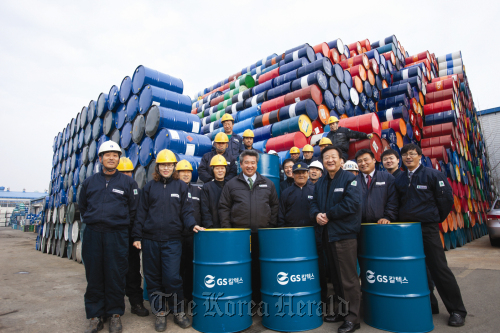Local conglomerates are boosting their efforts to support subcontractors in line with the government-led “mutual growth” drive.
The Lee Myung-bak administration has been keenly advocating shared prosperity between conglomerates and their smaller partners, urging the bigger firms to take the lead to help create a level playing field.
With the launch of Commission of Shared Growth for Large and Small Companies last December, the government set the pace for the scheme.
The commission, led by former Prime Minister Chung Un-chan, plans to introduce a “win-win index,” which rates businesses on their devotion to the goal of mutual growth.
Chung said on Feb. 23 that his team will assess 56 local corporations on how well they distribute their wealth with their smaller business partners.
Though the so-called “profit-sharing” scheme was strongly criticized by major conglomerates for being anti-market, they have nevertheless been complying with the direction.
The country’s major business groups including Samsung, Hyundai Motor, LG, SK and GS have been devising measures to assist their partner firms’ finance, research and materials procurement.
Most recently, Samsung Group, the nation’s largest conglomerate, on Wednesday pledged a number of measures including a 610 billion won ($558.7 million) fund, patent rights and improved payment systems to help promote growth in its smaller vendors and suppliers.
The Lee Myung-bak administration has been keenly advocating shared prosperity between conglomerates and their smaller partners, urging the bigger firms to take the lead to help create a level playing field.
With the launch of Commission of Shared Growth for Large and Small Companies last December, the government set the pace for the scheme.
The commission, led by former Prime Minister Chung Un-chan, plans to introduce a “win-win index,” which rates businesses on their devotion to the goal of mutual growth.
Chung said on Feb. 23 that his team will assess 56 local corporations on how well they distribute their wealth with their smaller business partners.
Though the so-called “profit-sharing” scheme was strongly criticized by major conglomerates for being anti-market, they have nevertheless been complying with the direction.
The country’s major business groups including Samsung, Hyundai Motor, LG, SK and GS have been devising measures to assist their partner firms’ finance, research and materials procurement.
Most recently, Samsung Group, the nation’s largest conglomerate, on Wednesday pledged a number of measures including a 610 billion won ($558.7 million) fund, patent rights and improved payment systems to help promote growth in its smaller vendors and suppliers.

The 610 billion won support will be used mainly for research and development and other costs needed to promote the health of the vendors, Samsung officials said.
More payments will be offered in cash, and Samsung affiliates pledged to pay their vendors three times a month, up from the current twice a month.
Samsung became the second Korean conglomerate subject to government assessment as part of the mutual growth index adopted by the Fair Trade Commission, following Hyundai Motor.
Hyundai Motor Group, whose flagships are Korea’s top automaker Hyundai Motor Co. and No. 2 Kia Motors Corp., also vowed last month to provide more than $400 million in support for its suppliers this year.
Under its new commitment, the group will create a 100 billion won development fund for its suppliers along with an additional 104.6 billion won to its existing 69 billion won emergency fund for its suppliers.
The group will also provide 250 billion won to help finance the research and development projects of its suppliers, the group said.
“Hyundai Motor Group is pursuing joint development with its partners based on fair and transparent partnerships,” said Yoon Yeo-chul, vice chairman of Hyundai Motor Co. “It will continue to expand its joint development program to help its partners become small global companies.”
GS Group, the country’s eighth-largest conglomerate, has also been at the forefront of pursuing mutual growth with subcontractors, led by its chairman Huh Chang-soo.
Huh has been stressing the matter, saying that a single business can no longer meet the high standards and diverse needs of contemporary consumers.
The group last year forged a 660 billion won worth of support for its partner firms in mutual growth funds, loans and direct monetary support, officials said. It also made such support measures eligible to secondary and tertiary suppliers.
GS Engineering & Construction, a major affiliate of GS Group, said Thursday that it would assist 20 of its contractors’ financing and share information with them.
Through the “Great Partnership,” the builder said it will provide its contractors with financial support and management know-how to boost their productivity and improve corporate culture.
“(As builders tend to rely a lot on their partner firms,) our co-prosperity with them is imperative. We plan to cooperate with them through continual communication,” GS Engineering CEO Huh Myung-soo said.
GS Caltex, the nation’s second-largest oil refiner under the group, decided to retain its policy to pay their smaller suppliers wholly in cash. It reduced the average payment period from six to 5.2 days, the firm said.
The oil firm is also assisting its smaller partners’ financing through organizing funds and offering them low-interest loans in alliance with financial institutions.
By Koh Young-aah (youngaah@heraldcorp.com)


















![[Today’s K-pop] Treasure to publish magazine for debut anniversary](http://res.heraldm.com/phpwas/restmb_idxmake.php?idx=642&simg=/content/image/2024/07/26/20240726050551_0.jpg&u=)